Don’t let too much of a good thing spoil your summer
Written by Ann Pietrangelo
Baseball, beach volleyball, gardening, hiking—what’s not to love about a sunshiny summer day? It’s a great idea to get a dose of sunshine every day, but too much of a good thing can hurt. Most experts agree that even one bad sunburn increases your chances of developing skin cancer. Sweltering temperatures can also bring on heat-related illnesses that can quickly become life threatening.
The term “sun poisoning” is a lay term, according to Sudip K. Bose, M.D., FACEP, FAAEM. Sun poisoning is an umbrella phrase that refers to severe sunburn, heat exhaustion, dehydration and heat stroke.
Heat stroke occurs when your body temperature soars and cooling mechanisms fail, causing your brain to overheat. The U.S. Centers for Disease Control and Prevention (CDC) warns that without emergency treatment, heat stroke can lead to coma, permanent disability or death.
As an attending emergency physician, Dr. Bose sees his share of heat-related emergencies. Patients who present with heat stroke may be unable to move or become comatose. Immediate steps must be taken to cool down the brain and rehydrate the body.
Risk Factors for Sun Poisoning
“Anybody can get sun poisoning,” cautions Bose, “but certain medical conditions, medications, or behaviors can make you more susceptible. There are a lot of misconceptions about sunburn and heat-related illness. In summer, sunburn and heat stroke can happen as easily in Chicago as it can in Miami.”
If you think you’re in the clear hanging out by the pool on a cloudy day, think again. That false sense of security may leave you with a painful sunburn. “We see that a lot,” says Bose.
The elderly are at particular risk of heat exhaustion and classic heat stroke during the hot summer months. Certain medications, especially those that affect blood pressure, heart rate and your ability to perspire can increase risk. Some medications can also make your skin more sensitive to the sun.
Athletes, even those who are in exceptional shape, can suffer heat-related illness if they are not acclimated to a new environment.
Warning Signs of Sun Poisoning
If you can feel the sun burning your skin, it’s time to find some shade or get indoors.
Symptoms of heat-related illness include:
- headache
- lightheadedness, dizziness
- pain, cramping
- fever, chills
- lack of perspiration
- nausea, vomiting
- dark urine
- fatigue, lethargy
Once the process of dehydration sets in, kidney and brain function are at risk.
How to Treat Sun Poisoning
Treat simple sunburn with ibuprofen and topical creams, especially those that contain aloe. See your doctor if a large part of your body is blistering, if you are in extreme pain or you develop fever or infection.
Heat exhaustion can generally be treated at home. If you don’t feel well in the heat, try to get to an air-conditioned building or a shady area. Hydrate with water—drinks containing sugar or alcohol can cause dehydration. If possible, take a cool bath or shower. Early efforts to correct heat exhaustion can help you avoid heat stroke.
If you’re vomiting and can’t keep liquids down, seek medical attention. If someone is hallucinating, unresponsive or appears to be in a coma, call 9-1-1 immediately.
How to Prevent Sun Poisoning
A former major in the U.S. Army, Bose treated soldiers and civilians while serving in Iraq. Even with temperatures soaring well above 100 degrees Fahrenheit and soldiers carrying 45-pound vests, heat-related illness was an infrequent occurrence.
“The military does a good job of preventing heat-related illness,” says Bose, “and we can take a lesson from that.” It takes the human body about two weeks to acclimate to a new environment and begin sweating effectively, so keep that in mind while vacationing or if you move to a warmer climate.
More prevention tips:
- Wear a hat and cover exposed skin when possible.
- Wear light-colored, loose-fitting clothing.
- Don’t overexert yourself, especially if you are in an unfamiliar climate. Save physical activity for the coolest part of the day.
- Drink water frequently—don’t wait until you feel thirsty! Remember, dehydration can occur at any time of year.
- When outdoors in the heat, use a spray bottle to mist yourself with cool water.
- Use a strong sunblock and reapply every two hours and after going in the water. Some sunscreens may be water resistant, but they’re not waterproof. Don’t forget to cover those easy-to-miss areas, such as behind your ears and the back of your neck.
- Ask your doctor or pharmacist if your medication will affect your heat tolerance.
- Check on elderly or ill neighbors during extreme temperatures.
The key is prevention, so remember to slip, slop and slap. That’s slip on a shirt, slop on some sunscreen and slap on a hat—and have a great time out there.



